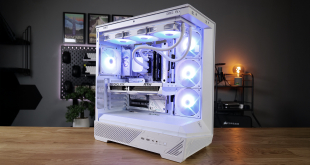It would be great to say “Told you so”, but we did not actually nail this scoop on the head. KitGuru spent much of the past 2 weeks analysing the available (and unavailable!) data on the PC market and we came to the published conclusion that HP was completely and utterly stuffed. KitGuru dons the black arm band and takes a look back at the demise of the world's largest PC company.
First up, HP is now in good company. IBM (to Lenovo) and Compaq (to HP – ironically) have already cashed in their Intel chips and gone to join the ranks of companies on Wikipedia that ‘used to be system manufacturers in their own right'.
Secondly, companies are owned by their shareholders – and some of these shareholders want a dividend. When PCs were shifting with gross profit margins close to 30%, then showing a healthy bottom line was pretty straightforward. Not so in today's world of wafer thin profits. A 20% drop in share price is never something that will be welcomed.
Looking at the trail that Apple has been blazing for the past few years, HP has finally decided to jump on the bandwagon and do more with software.
Smart move? Over-priced ink and over-priced software is where the money is – but can HP pick it up?
Also, to quote Microsoft founder Bill Gates, “If you see a bandwagon, then it's already too late”.
KitGuru opened its investigation by looking at the sheer volume of chips being pushed into the channel. We then examined the way that Acer was forced to write off millions and millions of pounds worth of stock – and we specifically asked the question that every other journal in the world seemed to have missed, which was “If things are grim for Acer, then just how bad must HP's problems be?”
Word then came through that more than half of the PC stock being held by Acer and HP was now more than 6 months old. This is a huge problem – and the implications were massive.
Our fourth investigative article in the series asked the hardest question possible, just how enormous will the negative impact be of consignment stock on long term cashflow for both Acer and HP – given that tons of their stock is more than 6 months old and being sold into majors like Dixons, whose payment terms are widely regarded as vicious.
Jenny Williams over at Computer Weekly has taken up the cause and revealed that HP is not only dumping stock left, right and centre – it's also running away from the PC business as fast as its corporate legs will carry it.
KitGuru was clear that Dell would be licking its lips in anticipation – and it seems we were right. One angle we missed was the possible involvement of Lenovo. Given that the darlings of the Chinese government were looking for a consumer brand – they must be kicking themselves that HP's bail out did not come sooner. While Medion is an admirable acquisition, it is not a global leading brand. HP is.
Repercussions? Major HP customers, who bought into the idea that ‘corporate suppliers like HP will always be there for you', must be wondering why they bothered.
Another potential long-term winner we flagged was Samsung. Moving HP out of the way on the tablet side of things, must mean increased opportunities for the Koreans.
With less than one year on the job, Leo Apotheker's reign as CEO has managed to oversee the single largest share value plummet in HP's history. Can he change the course the giant brand completely, fundamentally alter the company's business, become a superstar and retain his job? Worked for Carly, right?

KitGuru says: Whichever company makes a strong move for HP's business, will rule the PC world over the next couple of years. We have three strong suspicions about where HP's business might go. Watch this space!
Comment below or in the KitGuru forum.
 KitGuru KitGuru.net – Tech News | Hardware News | Hardware Reviews | IOS | Mobile | Gaming | Graphics Cards
KitGuru KitGuru.net – Tech News | Hardware News | Hardware Reviews | IOS | Mobile | Gaming | Graphics Cards


